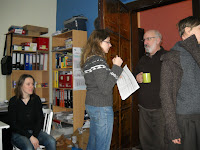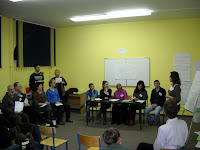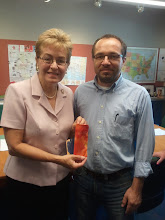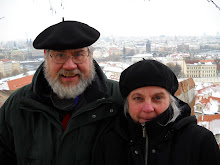


Katowice is a tough town. There used to be 6 working coal mines here, steel mills, shipping. They're down to 3 working mines, lots of the steel mills are closed. The place feels like Pittsburgh, with a Soviet city planner set loose. Older buildings are grimy, or overly serious, "soviet style". Unemployment is low - lots of students, people are still making it. But its a gritty, tough place.
Bona Fides is a Good Government group, and they've had some success in the five or so years they've been at it. Led by an energetic Katowice enthusiast, Grzegorz, they have a staff of 8 or so (part timers, shared staff, etc.) and they're all young, smart, ambitious and energetic. For two or three years they've been struggling to get a community organizing project started. Twice they reached out to do one-on-ones in target areas. Once another community engagement, community planning process came in on top of the organizing work and they held back to let it work. Another time the area was just too far from the office, the part time staffers couldn't sustain the effort along with all the watchdog stuff they were already committed to.
Bona Fides was supposed to be represented at this meeting in Szczecin by the Director and the lead organizer, Dagmara. Something came up, and another staffer, Martyna came in his place. Dagamara and Martyna charged right in to the Training of Trainers and Introduction to Organing sessions. They connected with the two young women from Romania who've been at it a little longer than them. They stayed up late at night, trading stories, hearing about the reality in other places - Bosnia, Ukraine, Slovakia.
It worked - they got more and more serious about making it happen, this time.
Chuck Hirt and I were scheduled to visit Katowice after the training. We met with Grzegorz on Sunday. Although he was coming down with a flu bug, he sat with us and planned out the two day staff meeting. "If we can get the whole staff really committed, I think we can make it work." But he said Martyna had been the most skeptical of a community organizing approach. He was concerned there would continue to be tensions.
On Monday we met at their offices - upstairs in a dingy building, seven or eight desks to a room, one room heated at a time - the typical NGO/community office. First, the two staff reported on what they'd learned, what they'd seen, what they brought home. (They reported in Polish. Chuck and I stood by, and I interjected some questions; "what surprised you? Who did you connect with? What inspired you?") Martyna was clear - all her questions had been answered,, she could see that it could be done. "If they can do it in Romania, we can do it here!"
Then I led them through a tough back-and-forth. What happened the last two times? You have lots of visibility, lots of access, lots of process wins with open government reforms. WHY do you want to organise? What can you get out of it? What will make it different this time? Grzegorz and the team said it ten different ways. What they had was access and influence - they lacked power. When an issue came up that they couldn't win they walked away. (He took us by the empty hole in the ground where the historic train station in the City Centre was demolished over feeble protest.) At one point he excused himself to take a media call. Sheepishly he reported it was a reporter looking for comment on wines and culinary trends. He knew it - he was becoming a fixed figure, as public character, and the peoples' voice was no stronger than before. "We keep winning process reforms like the right to propose legislation by initiative, but there are no citizens that are ready to take advantage of them."
Before we went to lunch, we agreed they'd settle for once and all the answer to the big questions: are we doing a community organizing project, who's the lead organizer, where will we work, will we stay with it and WHY!"
As you see from the picture, Chuck and I sat together. We talked about the food (great!) the weather (cold, a bit of snow) and our kids. The staff rattled away in Polish at the other end of the table.
When we started back up, they had an 18 month budget, one person entirely committed to the work, others contributing time, and a turf targeted.
The rest of the time was spent on details. How many one-on-ones? What commitments do we need in writing from management? What do we do when the city or the press or somebody tries to get to the community process through Bona Fides? Where do we get advice? But the whole tone had changed - not whether but when; not why it fsiled but how to do it right this time. By the end, we had hammered out a six month plan, with solid next steps.
It won't be easy, but they've settled the obstacles they couldn't overcome before - dedicated specific staff for enough time and no interference from other priorities. They'll have plenty of problems, but I expect great things from Dagmara, the lead organizer and the rest of the team - Ewa, Agata, Katarzyna and Martyna. Tough times don't last - tough people do!


















